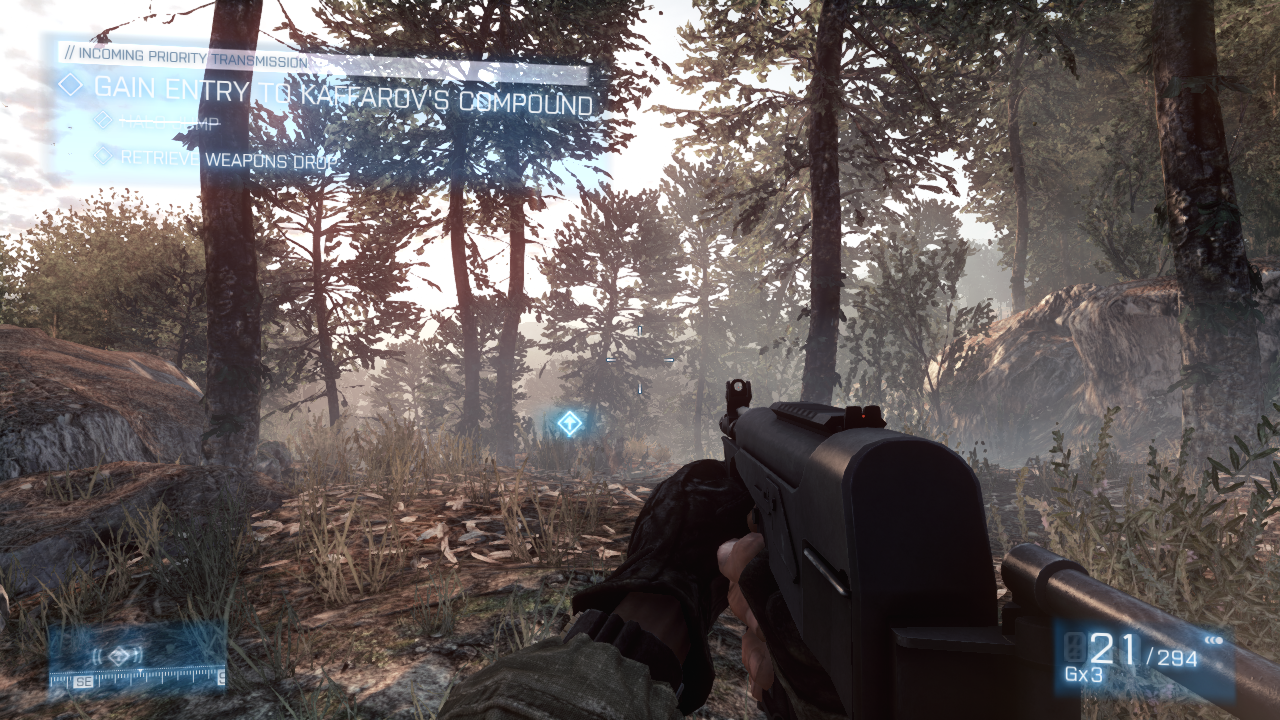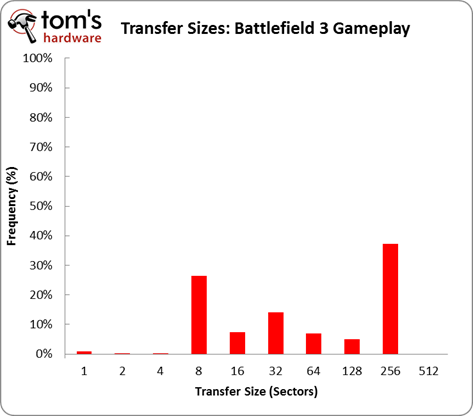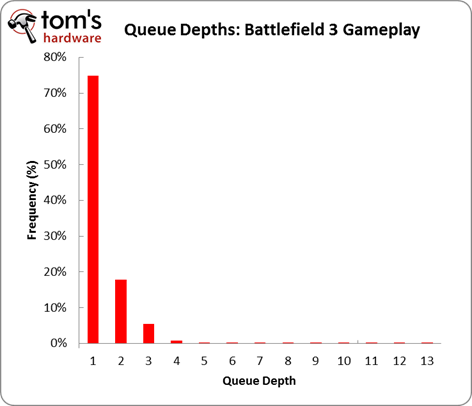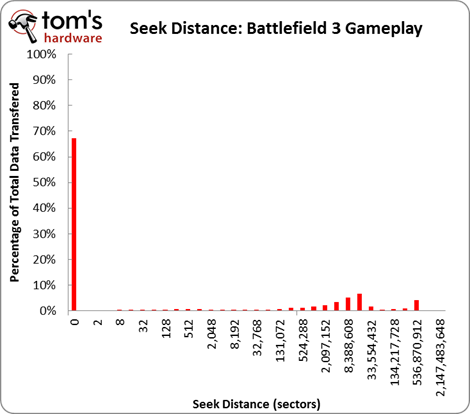Exploring SSD Performance In Battlefield 3, F1 2011, And Rift
Gameplay In Battlefield 3
The 18-minute captured trace from Battlefield 3 represents playing through the Kaffarov mission from the moment Dima hits the ground to when he jumps onto the helicopter.
| Overall Statistics | Battlefield 3: Gameplay |
|---|---|
| Elapsed Time | 18:13 |
| Read Operations | 8 206 |
| Write Operations | 1 708 |
| Data Read | 487.32 MB |
| Data Written | 25.95 MB |
| Disk Busy Time | 2.22 s |
| Average Data Rate | 231.32 MB/s |
When you fire up Battlefield 3 and load a mission, you're almost exclusively reading data from your drive. That matches our experience with Crysis 2. However, there's an interesting difference during gameplay. Whereas Crysis 2 registers a lot of write activity (which Crytek tells us can happen the first time through the game as shaders are compiled), Battlefield 3 is mostly reading data from the drive.
The result in Battlefield makes more sense than Crysis. As you're playing a game, there shouldn't be much reason to write to disk aside from saving the game state. However, progressing through a level necessitates loading textures, meshes, and so on.
Just as interestingly, most operations occur at a queue depth of one. Everyone's play style differs, but we shot our way through this mission quickly. In Crysis 2, fast action meant the game had to address more commands concurrently, resulting in higher queue depths. Battlefield 3 is different, as its storage operations don't stack up.
I/O Trends:
- 26% of all operations are 4 KB in transfer size
- 37% of all operations are 128 KB in transfer size
- 67% of all operations are sequential
- 75% of all operations occur at a queue depth of one
- 23% of all operations occur between a queue depth of two and three
Get Tom's Hardware's best news and in-depth reviews, straight to your inbox.
Current page: Gameplay In Battlefield 3
Prev Page Loading Levels In Battlefield 3 Next Page Launching F1 2011-
clonazepam Makes sense. I'll install sw:tor to the ssd after i figure out how to make its 20GB fit on it lol... the rest go to the HDD...Reply
Good read. Thanks for being so thorough. -
IMO, a WD Caviar Black or a Samsung Spinpoint F3 would have been a better test drive than the Green one.Reply
-
christoforo Thanks to all the reviews you made here guys. A couple of months ago I started planning my ssd purchase, and i decided to buy a Kingston HyperX 240gb bundle kit. I cant wait till it arrives. I have advanced computer skills, so many things I thought from personal experiences are published here, like I knew some games are more write dependant or read dependant from and HDD, and about the apps on the background on WIN7, and many many more. I already ordered my SSD, but its nice to have a serious review about ssds on gaming performance. Its all about the speed that the apps can be done by write/read on a ssd on the background that really matters, from this simple thing is that anyone willing to upgrade to an ssd can benefit with a smoother playable experience.Reply -
gmcizzle Storage can actually make a difference in FPS in certain situations. Only put in 2gb or so of RAM in the test system and rerun Battlefield 3, and the difference in frame rates will be different between HDD and SSD as the game switches to secondary storage once RAM is exhausted.Reply -
Supernova1138 True, but it is much more cost effective to add more RAM to your system in that circumstance than to get an SSD large enough for your OS and a couple of games. With RAM so inexpensive these days there is absolutely no reason to be running low on it under any gaming scenario.Reply -
cumi2k4 Agreed with xyzqwerty, please do another test with faster drives such as wd black or the f3. Comparing the ssd with green version is like racing your turtle with the neighbor's hare.Reply -
acku cumi2k4Agreed with xyzqwerty, please do another test with faster drives such as wd black or the f3. Comparing the ssd with green version is like racing your turtle with the neighbor's hare.Reply
I'm a little confused why you would want to see that comparison. We established there was no diff between a slow HDD and a fast SSD. And you expect a difference between a fast HDD and fast SSD?
Cheers,
Andrew Ku
TomsHardware.com -
silverblue asnorton44Interesting to see it won't imrpove all gameplayI see what you did there. :PReply -
FunSurfer Reply9523292 said:I'm a little confused why you would want to see that comparison. We established there was no diff between a slow HDD and a fast SSD. And you expect a difference between a fast HDD and fast SSD?
Cheers,
Andrew Ku
TomsHardware.com
He probably want to see that comparison on the "Hard Drive Performance Comparison" page, where is a big difference between SSD and HDD performance (the HDD up to 477% slower)



